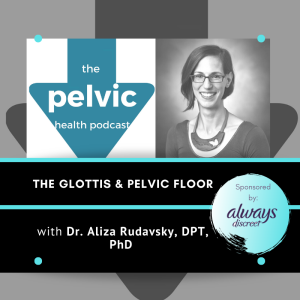
Friday Nov 06, 2020
The Glottis and Pelvic Floor
We know holding our breath can influence pressure onto the #pelvicfloor, but did you ever think about how this happens, or why, or that our vocal cords can influence this pressure?
Physical therapist and academic, Aliza Rudavsky, joins me to discuss her research in this area and some very cool facts about how the #glottis works and how this can influence the pelvic floor.
A native of Pittsburgh, Aliza grew up as a dancer. She studied modern dance in college and performed professionally for several years before going to graduate school for her Doctorate in Physical Therapy at the University of Washington in Seattle. As a physical therapist, Aliza has specialized training in pelvic floor dysfunction and women's health PT through the Herman and Wallace Institute. She trained as a dance PT through the Harkness Center for Dance Injuries and the Australian Ballet. She also has unique training in physical therapy for voice dysfunction and treats both performing artists and other occupational voice users.
Aliza completed her PhD in 2018 through the University of Copenhagen (in collaboration with Monash and Latrobe Universities in Melbourne, Australia) under the supervision of Dr. Jill Cook. Her research involved studying tendon development in adolescent ballet dancers. She has published this research in several sports journals as well as the International Association of Dance Medicine and Science.
Currently, Aliza is an assistant professor at Penn State University where she has a split appointment in the department of Kinesiology and the School of Theatre. In Kinesiology she teaches the athletic training students and does research, and in the School of Theatre she runs an on-site PT clinic for the musical theatre and acting students. Her current research involves connecting the pelvic floor to the vocal folds to study how they coordinate to regulate pressures in the trunk. This research is currently funded by the Foundation for PT Research-Pelvic Health Research.
Aliza is the mother of two delightful young boys with a third baby on the way. She enjoys biking, hiking and exploring central PA with her family.
Listen and enjoy and a big thanks to Always Discreet for sponsoring this episode of The Pelvic Health Podcast. Head to Always Discreet to learn more about bladder leak tips, management and incredible bladder leakage protection!
4 years ago
I would actually like to see a study using validated OM and comparing just PFD symptoms such as POP before and after Rx and see the effects and results of the study. Undoubtedly, PFMT in different positions and while breathing (even talking or yelling or singing) is the most functional task to teach our patients. I believe hypopressives is just another tool to promote motor control and physical activity just as Pilates and Yoga and both of them we keep promoting them in our clinics in Australi
4 years ago
Re hypopressives and research I just believe that the main problem is the question asked: is it hypopressives exercises better than kegel for strengthening PFM? Hypopressives is just another tool that we can use for certain things but never to substitute PFM. It's not meant to be the ultimate way of strengthening, it is another technique that could help us improve patient motor control and in many cases decrease PFD symptoms such as POP. I would actually like to see
4 years ago
In terms of functionality, yes, it might not be the most functional exercise due to the apnea. However, you mention in this same podcast about apnea while heavy weight lifting. If we extrapolate the hypopressives to the abdominal breathing for pelvic floor downtraining, how realistic is that our patient would be breathing abdominally the rest of the day outside those minutes of relaxation? Both are techniques that we use for very particular things, but mainly for diaphragm motor control.
4 years ago
Hi Lori, thanks for this podcast very interesting. I just wanted to comment on the hypopressives exercises. I am a women's health physio doing my master at Curtin but I also have experience in hypopressives. This technique comes from an ancient yoga breathing technique, so it's been out there for long. It might be tricky to teach if you don't know how to do it and if you haven't been trained to cue properly, same way that it would happen with teaching pelvic floor muscles training.